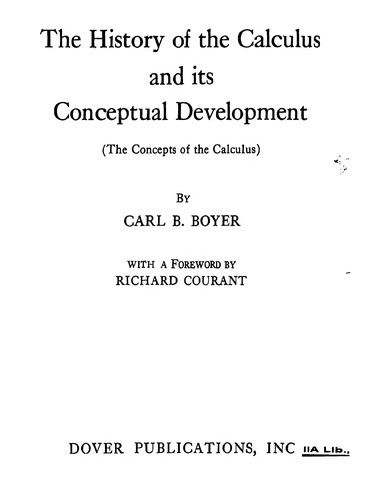jared@mathstodon.xyz reviewed The history of the calculus and its conceptual development by Carl B. Boyer (Dover histories and classics of science)
Detailed and Well-Sourced History (Recommended)
4 stars
I'm enjoying this history quite a bit. Boyer has done a phenomenal job reviewing many centuries worth of mathematical research, and giving an intricate analysis about how each of the primary sources build upon a few common philosophies to eventually arrive at modern calculus.
I'm not able to assess Boyer's historical or philosophical accuracy in interpreting the contributions each source makes towards the development of calculus. In particular, Boyer insistently argues that various mathematicians fall short of expressing the limit concept. For instance, Archimedes sometimes gets credit for expressing an idea very similar to our modern concept of the limit in his quadrature of the parabola. Is Archimedes performing a limit, just in his own terminology, or is he not? Boyer convincingly says "no", given that Archimedes works from the method of exhaustion and ratios of geometric figures, rather than a numerical series. In fact, Archimedes could not have, explains …
I'm enjoying this history quite a bit. Boyer has done a phenomenal job reviewing many centuries worth of mathematical research, and giving an intricate analysis about how each of the primary sources build upon a few common philosophies to eventually arrive at modern calculus.
I'm not able to assess Boyer's historical or philosophical accuracy in interpreting the contributions each source makes towards the development of calculus. In particular, Boyer insistently argues that various mathematicians fall short of expressing the limit concept. For instance, Archimedes sometimes gets credit for expressing an idea very similar to our modern concept of the limit in his quadrature of the parabola. Is Archimedes performing a limit, just in his own terminology, or is he not? Boyer convincingly says "no", given that Archimedes works from the method of exhaustion and ratios of geometric figures, rather than a numerical series. In fact, Archimedes could not have, explains Boyer, used what we recognize as a series given that he did not, and could not, given the philosophical landscape at the time, employ the use of infinity in his construction. I'm convinced by Boyer's argument, and dismissal of various competing interpretations, but I'm just not able to examine the primary sources to weigh the strength of his argument. So I have to take Boyer for his word on these points.
Sometimes, in order to underline the distinction between pre-modern and modern solutions to problems that now fall under the methods of calculus, Boyer gets repetitive. He rephrases again and again why the Greeks didn't possess a limit concept and subsequently why Europeans couldn't have, either, until the modern period. It's a bit tedious, but I guess I see why it's necessary if he's pushing against the idea that the Greeks were doing something related to our idea of the limit. They weren't, he says, even if we're inclined to see their methods from that vantage point.

